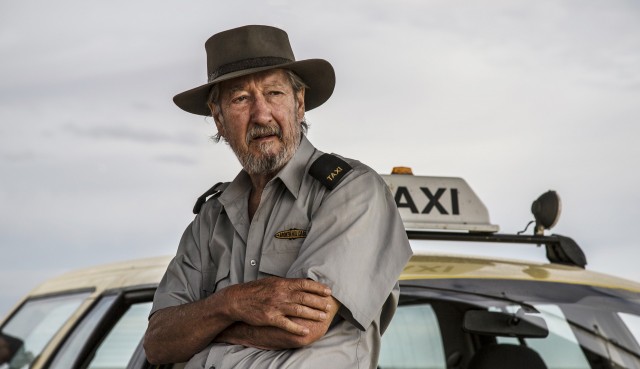
Rex (Michael Caton) has a long road ahead of him in LAST CAB TO DARWIN (photo by Wendy McDougall)
LAST CAB TO DARWIN (Jeremy Sims, 2015)
Cinema Village
22 East 12th St. between University Pl. & Fifth Ave.
Opens Friday, June 10
212-529-6799
www.lastcab.com.au
www.cinemavillage.com
 Jeremy Sims’s Last Cab to Darwin is a poignant road-trip movie about a man determined to end things on his own terms. Australian star Michael Caton (The Castle, The Sullivans) is Rex, a grizzled, gruff cabdriver who has never been outside his small hometown of Broken Hill, a mining city in the far west of the country. In his late sixties, he has reached the point where he says and does whatever he wants in life, regardless of the consequences. But when he is diagnosed with stomach cancer and given three months to live, he decides to get in his taxi and drive nearly two thousand miles across Australia to meet with Dr. Farmer (Oscar nominee Jacki Weaver), who has just developed a controversial new assisted suicide method in Darwin that Rex wants to be the first to use. Barely acknowledging his neighbor and lover, an Aboriginal woman named Polly (Ningali Lawford-Wolf), Rex hits the road, where he eventually picks up a young indigenous hustler, Tilly (Mark Coles Smith), and a British nurse-slash-barmaid, Julie (Emma Hamilton), and the three get caught up in some crazy adventures.
Jeremy Sims’s Last Cab to Darwin is a poignant road-trip movie about a man determined to end things on his own terms. Australian star Michael Caton (The Castle, The Sullivans) is Rex, a grizzled, gruff cabdriver who has never been outside his small hometown of Broken Hill, a mining city in the far west of the country. In his late sixties, he has reached the point where he says and does whatever he wants in life, regardless of the consequences. But when he is diagnosed with stomach cancer and given three months to live, he decides to get in his taxi and drive nearly two thousand miles across Australia to meet with Dr. Farmer (Oscar nominee Jacki Weaver), who has just developed a controversial new assisted suicide method in Darwin that Rex wants to be the first to use. Barely acknowledging his neighbor and lover, an Aboriginal woman named Polly (Ningali Lawford-Wolf), Rex hits the road, where he eventually picks up a young indigenous hustler, Tilly (Mark Coles Smith), and a British nurse-slash-barmaid, Julie (Emma Hamilton), and the three get caught up in some crazy adventures.
Rex is the kind of a man who, when Dr. Farmer tells him to keep up his fluids, buys a six-pack of beer, not exactly the best medicine. As they approach Darwin, all three travelers take stock of their lives, even as Rex looks to end his. Unfortunately, Dr. Farmer’s character is too underdeveloped, the film stumbles when dealing with racism, and the final scenes are a major cop-out with a gaping plot hole. But there’s still much to enjoy in this well-made film, which features many lovely shots of sunsets and sunrises, courtesy of cinematographer Steve Arnold, signaling the beginning and the end. The story, adapted by Reg Cribbs from his own play, was inspired by the real-life case of Australian cabdriver Max Bell, a cancer sufferer who in August 1996 drove from Broken Hill to Darwin (yes, Darwin is the name of the town he went to, not a movie metaphor evoking the survival of the fittest) shortly after the passage of the Rights of the Terminally Ill Act in order to go through voluntary euthanasia. Rex’s fiction turns out to be very different from Bell’s reality.